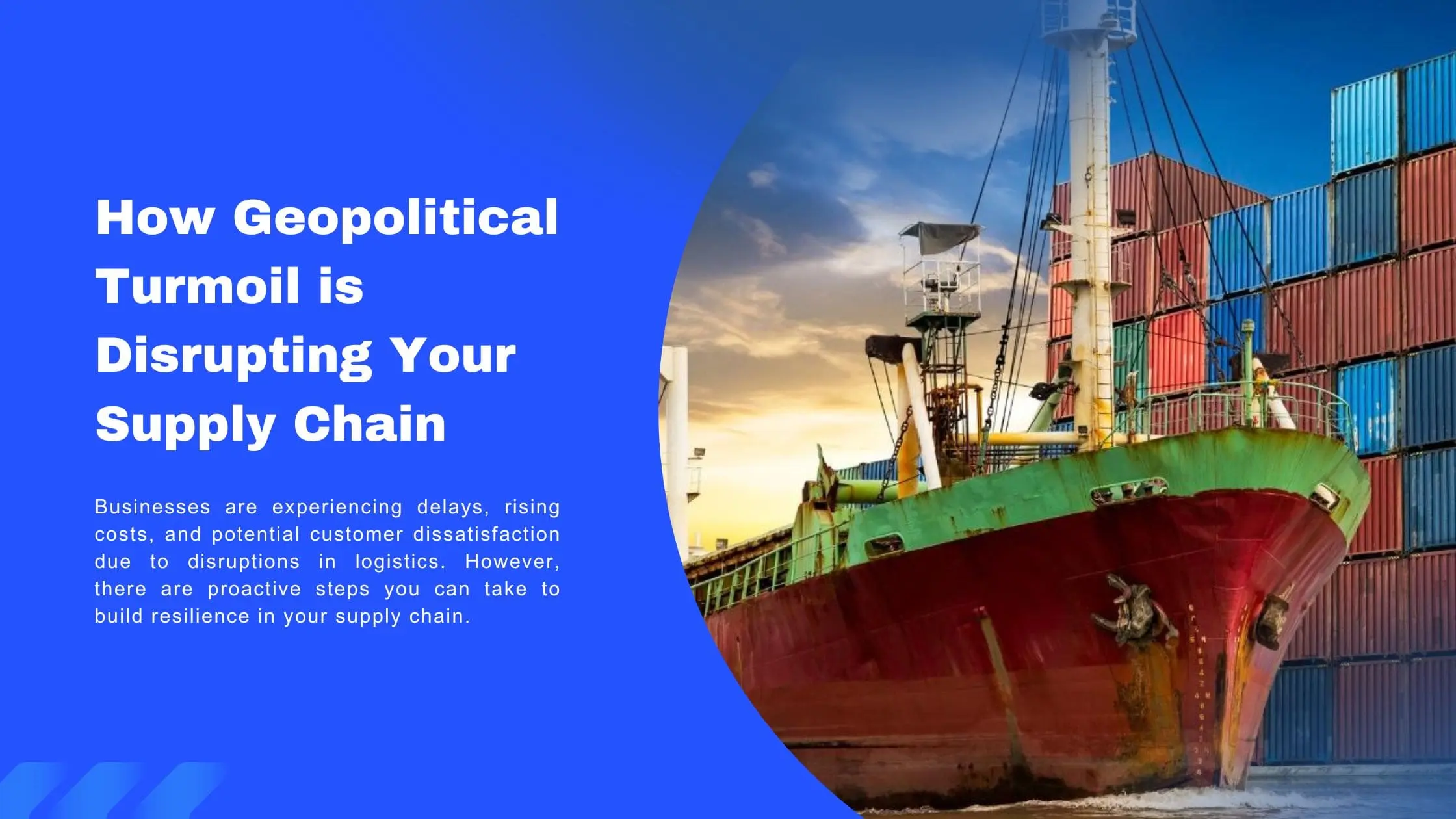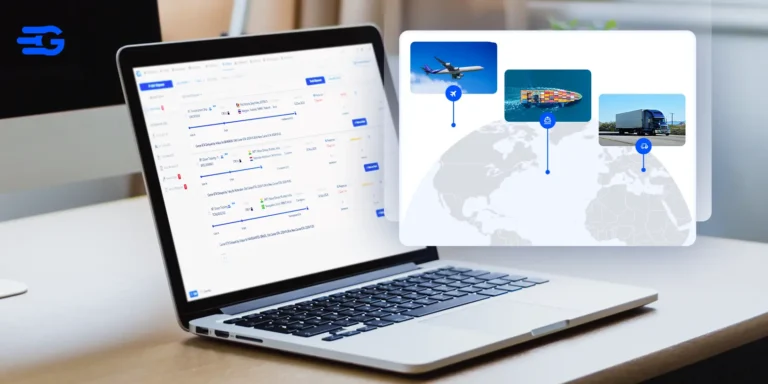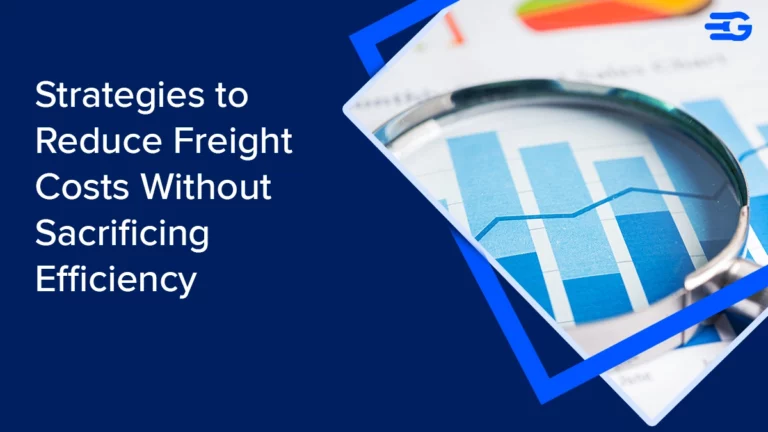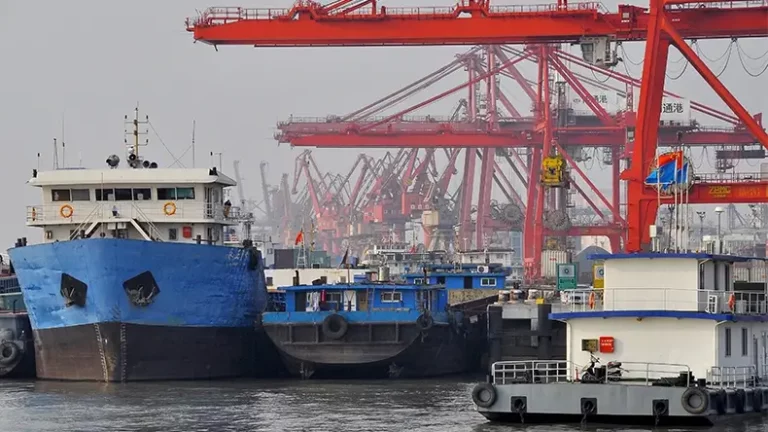How Geopolitical Turmoil is Disrupting Your Supply Chain
Global trade relies heavily on a smooth-running supply chain. Every step needs to happen on time for things to work. Unfortunately, recent geopolitical events are causing problems for this complex system, leading to delays, higher costs, and unhappy customers.
Let’s look into how these events are impacting the movement of goods around the world, the consequences businesses are facing, and how you can develop a more resilient supply chain.
Recent Disruptions Crippling Logistics
Supply chain leaders are feeling the heat. A recent survey by A.T. Kearney, a major consulting firm, found that over 70% of them see geopolitical instability as a major threat to their operations. And there’s good reason to worry. Shipping costs have skyrocketed, with the Baltic Exchange Dry Index jumping a whopping 85% in the first half of 2023 compared to the year before. This surge is largely due to events like the war in Ukraine and ongoing port congestion.
Let’s delve into specific examples to understand how geopolitical events are translating into logistical nightmares:
A Bridge Too Far: The Baltimore Incident and Port Congestion
News of a major disruption emerged on March 26th, 2024, at approximately 1:00 am, that the container vessel Dali collided with the Francis Scott Key Bridge, leading to its collapse. This bridge accident in Baltimore has triggered a cascade of consequences. According to the Maryland Department of Transportation, the critical port faced a temporary shutdown due to the incident. This disruption has caused severe congestion and delays, significantly impacting billions in estimated trade. These events highlight the vulnerability of vital transportation links in the global supply chain, underscoring how isolated incidents can have widespread ramifications.
Red Sea Reroute: A Case Study in Geopolitical Risk
The Red Sea, a vital artery for global trade, has faced security threats in recent times. Ships are being rerouted via the Cape of Good Hope, significantly increasing transportation costs by an estimated 10-15% due to longer distances. This highlights how geopolitical tensions can force businesses to choose between efficiency and safety, impacting their bottom line.
Beyond the Red Sea and Baltimore: Other Major Disruptions from the Past Year
It’s not all bridge collapses and reroutes causing chaos. The ongoing trade war between the US and China is a major thorn in the side of businesses. These two giants have been slapping tariffs on each other’s goods, making them more expensive to move around. This back-and-forth fight is making international trade more complicated and expensive.
Then there’s the war in Ukraine. This conflict is disrupting global energy markets, which means fuel costs are rising. On top of that, it’s causing problems with shipping routes in the region. All these events are creating a tangled web of challenges that businesses need to figure out how to navigate.
The Ripple Effect: How Logistics Disruptions Impact Your Business
Rising Costs, Shrinking Profits: The Financial Impact of Disruptions
Port closures, reroutes, and longer distances lead to delayed deliveries and increased transportation costs. Demurrage and detention charges for delayed arrivals at ports, further impact your bottom line. Additionally, carriers may impose surcharges like BAF (Bunker Adjustment Factor) to cover rising fuel costs.
A study by McKinsey & Company [McKinsey & Company, The ripple effect of disruptions on global trade, 2023] estimates that these factors can collectively increase logistics costs for businesses by up to 20%.
Transportation Disruptions and Inventory Management
When deliveries become unpredictable, it becomes challenging to anticipate when inventory will arrive, disrupting the entire delivery schedule. This unpredictability can result in overstocking and understocking impacting hugely the capability to strategically plan the forecast.
Building a More Resilient Logistics Network: Weathering the Storm
The good news is, that there are ways to build resilience in your logistics network and mitigate the impact of geopolitical disruptions:
Embracing Technology for Visibility and Control
Real-time tracking platforms, planning tools and data analytics give you crucial visibility into potential disruptions, allowing for proactive risk management. By leveraging technology, you can identify potential bottlenecks, reroute shipments if necessary, and optimize your delivery schedules.
Partnering for Success: Building Strong Carrier Relationships
Negotiate flexible contracts with carriers to secure capacity during peak seasons and navigate disruptions more smoothly. Strong carrier relationships can ensure you have access to alternative routes and transportation options when faced with unforeseen events.
Navigate the Disruptions, Fortify Your Supply Chain With GoComet’s Upcoming Event
GoComet is hosting an insightful event focused on the critical theme of “Navigating Disruptions in Supply Chain and Logistics: Challenges and Impacts.” Scheduled for April 16th, 2024, this roundtable discussion offers a unique opportunity to delve into the complexities of supply chain management.
Stay connected as we delve into the expertise of industry leaders and peers, uncovering invaluable insights. Together, we’ll explore effective strategies aimed at constructing resilient logistics networks capable of navigating through unexpected challenges and disruptions with ease.
In conclusion, geopolitical turmoil is presenting significant challenges to the global supply chain. Businesses are experiencing delays, rising costs, and potential customer dissatisfaction due to disruptions in logistics. However, there are proactive steps you can take to build resilience in your supply chain.
Embracing technology for real-time tracking and data analysis, partnering with carriers for flexible contracts, and diversifying your sourcing strategy can all help you navigate these disruptions and ensure your business continues to operate smoothly. Remember, in a world of constant change, adaptability is key.






